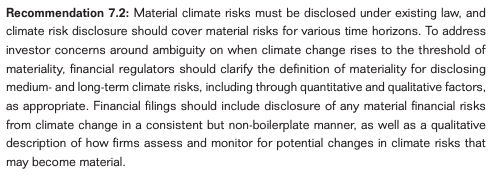Thread on new @CFTC #climaterisk report. Here are the highlights: First & perhaps most importantly, this report was a) commissioned by a majority-Republican federal regulatory agency and b) represents the consensus views of banks, investors, big companies, academics & enviros 1/
2/ Topline message: "US financial regulators must recognize that climate change poses serious emerging risks to the US financial system, and they should move urgently and decisively to measure, understand, and address these risks." Full report here (PDF): https://www.cftc.gov/sites/default/files/2020-09/report%20of%20the%20Subcommittee%20on%20Climate-Related%20Financial%20Market%20Risk%20-%20Managing%20Climate%20Risk%20in%20the%20U.S.%20Financial%20System%20for%20posting.pdf
3/ Notably, the CFTC #climaterisk report does not just make recommendations to the CFTC, and is not limited by the jurisdiction of this agency (commodities, derivatives markets, etc). Also notable: the recommendations aren't binding. If Biden wins, they'll be a blueprint at best.
4/ First big recommendation is a no brainer but also doesn't tell us much: US should put a price on carbon. No details on what that price should be, or how it should be implemented (cap & dividend, etc). Report author @NatKeohane & his team at @EnvDefenseFund have much to say tho
5/ Next big rec: FSOC, created after the last financial crisis, should "incorporate climate-related financial risks into its existing oversight function, including its annual reports and other reporting to Congress."
6/ Notable: Financial regulators should dig into climate-related “sub-systemic” shocks to financial markets & institutions in particular sectors/regions. This moves well beyond @FSB_TCFD & @NGFS_, which are limited by the macroprudential "systemic risk" mandate of central banks
7/ Speaking of NGFS, the CFTC #climaterisk report urges US financial regulators to get back in the international governance game, calling for the US to join, "as full members," the NGFS, Coalition of Finance Ministers for Climate Action, and the Sustainable Insurance Forum (SIF).
8/ Climate risk stress testing! Financial regulators should conduct stress tests of bank & insurer balance sheets "against a common set of scenarios." Notably, agricultural, community banks & non-systemically important regional banks should be included, not just the big banks.
9/ Report calls for the US to follow the lead of international counterparts who've already begun to conduct climate risk stress tests against common scenarios... and yet... the Bank of England has delayed its much-anticipated stress test due to Covid. Ugh! https://www.bloomberg.com/news/articles/2020-05-07/bank-of-england-postpones-climate-stress-tests-to-focus-on-virus
10/ Data! Regulators should work with private sector to support a "range of platforms for climate
data and analysis," including "new and existing
open source platforms, as well as proprietary efforts to develop new climate risk datasets and tools." More #climatetech VC activity?
data and analysis," including "new and existing
open source platforms, as well as proprietary efforts to develop new climate risk datasets and tools." More #climatetech VC activity?
11/ Wading into the scenario analysis debate, the report calls for financial regulators to use more than one scenario, and points to "well below 2 degrees," current trajectory, & something "in between." This is not surprising given cmte membership, but will still disappoint many!
12/ The CFTC #climaterisk report also nods to the important "Inevitable Policy Response" work of @PRI_News, calling for financial regulators to "analyze a scenario involving a major policy disruption" because "unanticipated policies can abruptly strand long-lived capital assets."
13/ Showing how far #scenarioanalysis debate has come since #TCFDRecs, the report calls for scenarios that a) capture broad impacts but with a focus on materiality, b) map macroeconomic & financial transmission mechanisms, and c) account for "adaptation" to the extent feasible!
14/ Disclosure! Further solidifying TCFD as the baseline against which policy will be judged, the report says regulators must use principles derived from #TCFDRecs "when developing rules on climate risk disclosure, implementing existing rules/guidance, or seeking public comment."
15/ Super interesting tidbit for securities lawyers, law profs & @SASB aficionados: the report appears to invite regulators to push on the time horizon for what counts under under long-settled law on "materiality," e.g. TSC v. Northway standard. How long before litigation ensues?
16/ Thanks no doubt to @MindyLubber's membership on the committee, report calls for SEC to "review and update" its 2010 guidance on climate risk disclosure and "consider rulemaking, where relevant" to ensure implementation of the guidance. Expect much more action from @SEC_News!
17/ In a move that will excite/frustrate carbon accounting folks in equal measure, report says listed companies should be required to disclose Scope 1 & 2 emissions, and as "consistent methodologies" emerge, Scope 3 emissions "to the extent they are material." @pcafglobal @DCIvan
18/ In the latest endorsement of the #netzero finance imperative, report devotes a whole chapter (Ch. 8) to what financial regulators can do, and what the US government can do through *fiscal* policy, to align the economy with a pathway to net zero emissions by midcentury. Nice!
19/ DOL ERISA ESG smackdown! https://twitter.com/dfirgs/status/1303708575982854145?s=21 https://twitter.com/dfirgs/status/1303708575982854145
20/ There’s much more to say about the recommendations, their timing today with the Western US ablaze, and the path forward in 2021. For now, the most important thing anyone can do to make this report come to life is to get Joe Biden elected in November! https://www.cleanenergyforbiden.com/

 Read on Twitter
Read on Twitter


